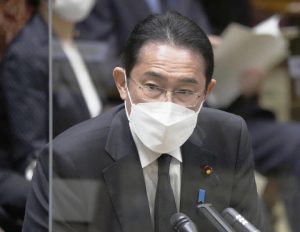Involving three non-nuclear principles, Kishida administration carries on past DPJ stance about government’s right to decide on introduction of nuclear weapons
Mar. 8, 2022
by Yohei Yamamoto, Staff Writer
On March 7, when addressing the Budget Committee in the House of Councilors (upper house of the Diet), Prime Minister Fumio Kishida (representing Hiroshima Prefecture’s District No. 1) called once again for Japan to adhere faithfully to its three non-nuclear principles. On the other hand, Mr. Kishida touched on a comment made by Katsuya Okada, a previous minister for foreign affairs who had once insisted that the introduction of U.S. nuclear weapons into Japan in a national emergency “is a fateful decision that should be made by the administration in office at the time.” Mr. Okada made the statement in 2010 when the Democratic Party of Japan (DPJ) was in power. Mr. Kishida remarked that his administration is carrying on the same stance.
With Russia’s suggestion after its invasion of Ukraine that nuclear weapons use was on the table, Japan’s former Prime Minister Shinzo Abe (representing Yamaguchi Prefecture’s District No. 4) and other lawmakers proposed to hold discussions about a policy of nuclear sharing, which would allow the placement of U.S. nuclear weapons within Japan’s territory under the joint control of both countries. That line of questioning concerning how the proposed nuclear-sharing policy aligned with Japan’s three non-nuclear principles of not permitting the manufacture, possession, or introduction of nuclear weapons was put forth by Hiroyuki Konishi, an upper house member representing the Constitutional Democratic Party of Japan.
Mr. Kishida asserted that the idea of Japan Self Defense Forces (JSDF) planes transporting nuclear weapons was not in alignment with the principle of not permitting the introduction of nuclear weapons into the territory of Japan, one of the three non-nuclear principles. Mr. Kishida explained, “Japan has the right to defend itself. Maintenance of the minimum of defense forces necessary is not prohibited by Paragraph 2, Article 9 of Japan’s constitution. The conventional stance of the government is that possession of nuclear weapons is not necessarily banned by the constitution.” He added, “However, because I feel as if Japan has made the three non-nuclear principles a national policy, we are not entertaining the idea of possessing nuclear weapons.”
At the same time, Mr. Kishida held up the comment made by Mr. Okada, who was the minister for foreign affairs in the DPJ administration. At a lower house Foreign Affairs Committee meeting held in March 2010, Mr. Okada declared that Japan would firmly adhere to the three non-nuclear principles, but added, “If Japan’s security could not be maintained without allowing nuclear-capable U.S. warships to make a temporary port of call in Japan, the administration in power at the time should make a fateful decision at the last minute regarding the introduction of nuclear weapons while working to explain the situation to the Japanese public.” Mr. Kishida said, “My administration is carrying on the stance expressed in Mr. Okada’s statement.”
(Originally published on March 8, 2022)
On March 7, when addressing the Budget Committee in the House of Councilors (upper house of the Diet), Prime Minister Fumio Kishida (representing Hiroshima Prefecture’s District No. 1) called once again for Japan to adhere faithfully to its three non-nuclear principles. On the other hand, Mr. Kishida touched on a comment made by Katsuya Okada, a previous minister for foreign affairs who had once insisted that the introduction of U.S. nuclear weapons into Japan in a national emergency “is a fateful decision that should be made by the administration in office at the time.” Mr. Okada made the statement in 2010 when the Democratic Party of Japan (DPJ) was in power. Mr. Kishida remarked that his administration is carrying on the same stance.
With Russia’s suggestion after its invasion of Ukraine that nuclear weapons use was on the table, Japan’s former Prime Minister Shinzo Abe (representing Yamaguchi Prefecture’s District No. 4) and other lawmakers proposed to hold discussions about a policy of nuclear sharing, which would allow the placement of U.S. nuclear weapons within Japan’s territory under the joint control of both countries. That line of questioning concerning how the proposed nuclear-sharing policy aligned with Japan’s three non-nuclear principles of not permitting the manufacture, possession, or introduction of nuclear weapons was put forth by Hiroyuki Konishi, an upper house member representing the Constitutional Democratic Party of Japan.
Mr. Kishida asserted that the idea of Japan Self Defense Forces (JSDF) planes transporting nuclear weapons was not in alignment with the principle of not permitting the introduction of nuclear weapons into the territory of Japan, one of the three non-nuclear principles. Mr. Kishida explained, “Japan has the right to defend itself. Maintenance of the minimum of defense forces necessary is not prohibited by Paragraph 2, Article 9 of Japan’s constitution. The conventional stance of the government is that possession of nuclear weapons is not necessarily banned by the constitution.” He added, “However, because I feel as if Japan has made the three non-nuclear principles a national policy, we are not entertaining the idea of possessing nuclear weapons.”
At the same time, Mr. Kishida held up the comment made by Mr. Okada, who was the minister for foreign affairs in the DPJ administration. At a lower house Foreign Affairs Committee meeting held in March 2010, Mr. Okada declared that Japan would firmly adhere to the three non-nuclear principles, but added, “If Japan’s security could not be maintained without allowing nuclear-capable U.S. warships to make a temporary port of call in Japan, the administration in power at the time should make a fateful decision at the last minute regarding the introduction of nuclear weapons while working to explain the situation to the Japanese public.” Mr. Kishida said, “My administration is carrying on the stance expressed in Mr. Okada’s statement.”
(Originally published on March 8, 2022)








